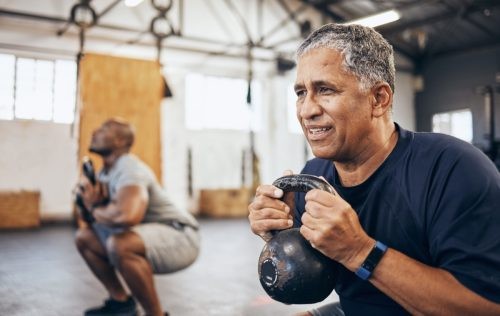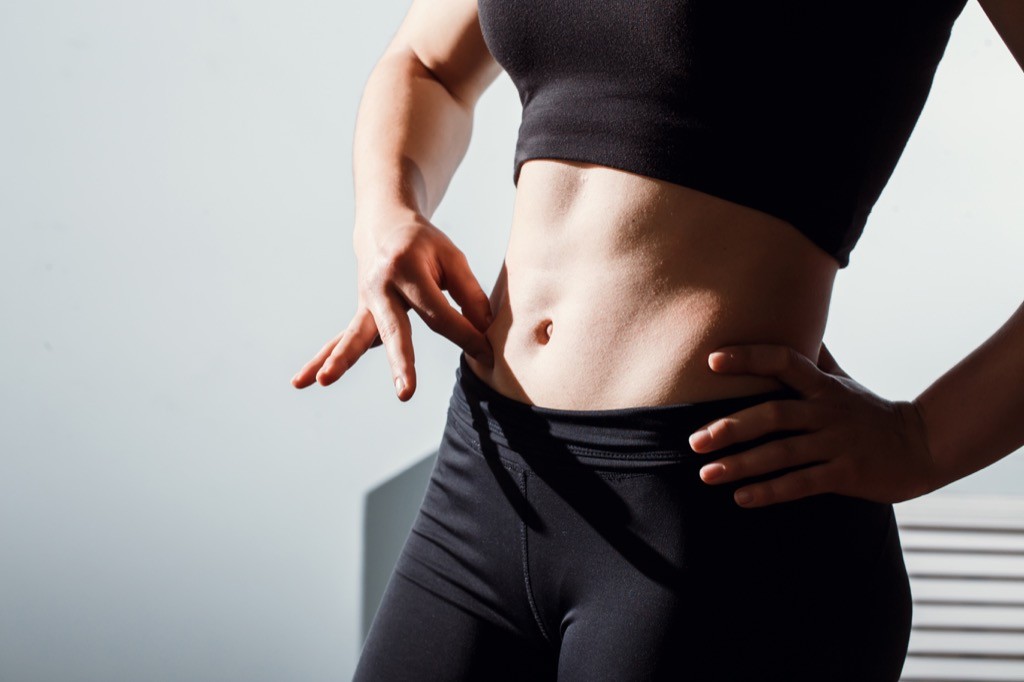Interval Training Can Kick-Start Your Weight Loss. Here’s How

If you’re looking around for a great exercise routine that burns a lot of calories in a short amount of time, HIIT might be perfect. “I recommend interval training for people who are busy but still want to get fit, because it gets great results in a fraction of the amount of time compared to more traditional cardio workouts. Interval training can be a powerful tool in a well-rounded fitness plan,” says Anne Friedlander, PhD, exercise physiologist and assistant director of Stanford Lifestyle Medicine. Here’s how interval training can kick start your weight loss.
RELATED: HIIT Boosts Brain Health!
What Is HIIT?

HIIT can be adapted to your current fitness level—don’t be intimidated! “High Intensity Interval Training (HIIT) is a type of exercise training which alternates between higher intensity exercise bouts separated by recovery periods of complete rest or light intensity exercise within the same workout session,” say Mariana K. Pencheva-Yanev, CEP, and Dr. Amanda R. Bonikowske, PhD, via the Mayo Clinic Health System. “HIIT exercise can be performed using any modality including body weight and intervals can range from 10 seconds to 4 minutes and rest period duration can be adapted based on training goals and fitness level.”
HIIT and Fat Loss

When done consistently, HIIT offers many health benefits beyond weight loss. “HIIT performed twice per week improves cardiometabolic health and further benefit occurs when performed three times per week such as increased fat loss, lowering of LDL cholesterol, and improved mental well-being,” say Bonikowske and Pencheva-Yanev. “A more comprehensive exercise program may include 2-3 days of HIIT in addition to MICT and other aerobic and strength training activities on the other days of the week.”
Calorie Burn Benefits During and After HIIT

One of the main benefits of HIIT workouts is the high calorie-burn, both during and after exercise. “HIIT and other high-intensity exercise programs help you burn a lot of calories in a short amount of time,” says UC Davis. “Research has also showed that you keep burning calories for hours after your workout is finished. These workouts typically cause you to burn more fat and build muscle. Studies have also showed that high-intensity workouts may help lower blood pressure and heart rate.
Blood Sugar Benefits

HIIT is not just good for weight loss through calorie burn, but through blood sugar improvements. “Study after study shows that HIIT can reduce blood sugar and improve insulin resistance, making it an ideal option for those with Type 2 diabetes or prediabetes,” says the Cleveland Clinic.
RELATED: 7 Activities Equal to Walking 10,000 Steps.
HIIT and Aerobic Workouts

HIIT can be combined with other workouts. “Rather than viewing aerobic and HIIT training as mutually exclusive, consider incorporating both into your routine to reap the benefits of each,” Christina Sauder, MS, tells Vail Health Behavioral Health. “HIIT is more efficient but a little harder on the body, while aerobic exercise is a bit more comfortable but requires longer workouts to reap the benefits. Aim for at least 1 HIIT workout and 150 minutes of moderate aerobic activity per week. Integrating regular aerobic sessions with occasional HIIT workouts can provide a well-rounded approach to fitness, promoting cardiovascular health, metabolic efficiency, and overall well-being.”
HIIT and Heart Health

As with most cardio workouts, HIIT can benefit your heart. “Researchers found that getting your ticker pumping a bit more vigorously on a regular basis can help reduce high blood pressure if you have obesity or are carrying a few extra pounds,” says the Cleveland Clinic.
Don’t Do HIIT Every Day

Make sure to allow your body to rest. “Whether your goals relate to health, performance, or body composition changes, research has shown time and time again that IT protocols provide a time efficient way to target those goals,” says Dr. Friedlander. “However, you shouldn’t do IT every day as the intense nature of the activity requires sufficient recovery time, so as not to wear yourself down.”
Every Little Helps

Start slow and build up your fitness levels. “HIIT is a great addition to your exercise routine because it addresses many barriers to exercise, leads to significant cardiometabolic improvements, and provides endless variation so you’re bound to find something you enjoy,” say Bonikowske and Pencheva-Yanev. “Whether you have a well-established HIIT program, or you’re just trying to increase your daily HIIT exercise snacks by briskly climbing up the stairs, or getting up for 30 seconds of lunges or squats every hour over the course of the day, HIIT can help you reach your fitness and wellness goals.”
RELATED: The 10 Best Ways to Lose 10 Pounds Fast.